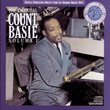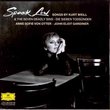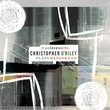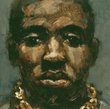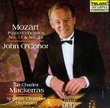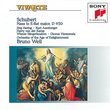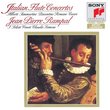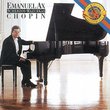| All Artists: Brian Rayner Cook, Ralph Vaughan Williams, Bryden Thomson, London Philharmonic Chorus, London Philharmonic Orchestra, Edith Wiens Title: Vaughan Williams: Dona Nobis Pacem, etc / Bryden Thomson Members Wishing: 1 Total Copies: 0 Label: Chandos Release Date: 9/30/1992 Genre: Classical Styles: Opera & Classical Vocal, Historical Periods, Modern, 20th, & 21st Century, Symphonies Number of Discs: 1 SwapaCD Credits: 1 UPC: 095115859025 |
Search - Brian Rayner Cook, Ralph Vaughan Williams, Bryden Thomson :: Vaughan Williams: Dona Nobis Pacem, etc / Bryden Thomson
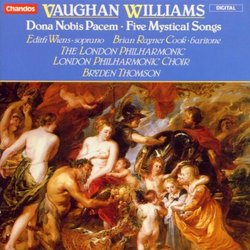 | Brian Rayner Cook, Ralph Vaughan Williams, Bryden Thomson Vaughan Williams: Dona Nobis Pacem, etc / Bryden Thomson Genre: Classical
|
Larger Image |
CD DetailsSimilar CDsSimilarly Requested CDs
|
CD ReviewsMusic for our Time Grady Harp | Los Angeles, CA United States | 06/08/2005 (5 out of 5 stars) "Ralph Vaughan Williams remains an anachronism in music: some dismiss him as a pudgy old pompous British routineer whose time is past (if it ever was); others find the depth of beauty in his music that somehow seems even more pertinent today than it was during his successful career as a composer. Case in point is DONA NOBIS PACEM a complex work for large orchestra and chorus and soprano and baritone soloists. In 1936 when it was compiled (for it is a mixture of various movements written at different times in Vaughan Williams' life) it had an impact on the Brits as the ominous, dark cloud of War was gradually drifting over the British Isles from Germany. It is a stunning combination of passages from the mass (in title, in the use of the Agnus Dei), from scriptural selections from Jeremiah, Daniel, Psalms etc, and from the Civil War poetry of Walt Whitman. The effect of this work is more than an oratorio (though some classify it as such). In many ways it relates to the Vaughan Williams 'Sea Symphony' in structure. The emotional effect is more related to the 'War Requiem' of Sir Benjamin Britten. The orchestral and choral writing are solidly in the British tradition and the solos superimposed on the fabric of the combined forces is eloquent and deeply moving. And at a time when the entire world cries out for peace there are few works in music than can equal the impact of this great score. Bryden Thomson conducts the London Philharmonic orchestra and choir and explores all of the intricacies of the piece while keeping a steady eye to the gradual building of the climxes. Both soprano Edith Wiens and baritone Brian Rayner Cook are exemplary soloists. The 'Five Mystical Songs' are less impressive in impact yet they show much of Vaughn Williams penchant for finding a successful means for using the English language in a musical setting. Set to poems by George Herbert the work calls for orchestra, choir and baritone soloist and while the piece is recognizable Vaughan Williams (it was written in 1911), it surfaces memories of the old school of Horatio Parker ('Hora Novissima') and others. Nice to hear but not especially memorable, yet it would be difficult to imagine a better performance of the work than this. Buy this CD for the DONA NOBIS PACEM and let it lift your spirits! Grady Harp, June 05 " Intenso, profundo, magnífico tulioleal | Brasilia, Distrito Federal BRAZIL | 08/14/2001 (5 out of 5 stars) "Também tive a oportunidade de cantar essa peça (Dona Nobis). É até difícil traduzir a intensidade da música e da poesia que esta peça transmite a quem tem a oportunidade de escutá-la. De fato, trata-se de um perfeito casamento entre a poesia de Whitman com a música de Williams. Quando a poesia torna-se intimista ("I see the white face in the coffin") a música é densa, pesada, lenta, com um baixo soando graves notas, entretanto, em outro trecho ("beat beat drums!!) a música soa efetivamente como o rufar de tambores, e o coro cantando em fortíssimo. Sugiro não só a compra deste CD, como de uma partitura ou ao menos da letra da música para uma melhor "degustação" desta obra prima." Dona starwars_freak1 | Fullerton, Ca United States | 02/18/2003 (5 out of 5 stars) "As a freshman in high school I was priviledged to perform with the CSUF University Singers and the Pacific Chorale, myself being a member of the Pacific Youth Chorale. We performed Dona Nobis Pacem and it was one of the most moving pieces ever performed. From the sadness of the Dirge for two veterans, to the uplifting ending of the final movment. This piece is one of the most beautiful out there."
|

 Track Listings (11) - Disc #1
Track Listings (11) - Disc #1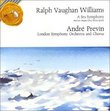
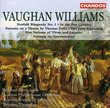
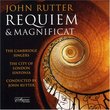
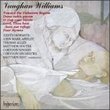
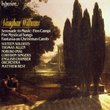
![Vivaldi : The Four Seasons (from Il Cimento dell 'Armonia e dell 'Inventione, Op. 8) [RARE]](https://nationalbookswap.com/cd//m/90/6390/13316390.jpg)
